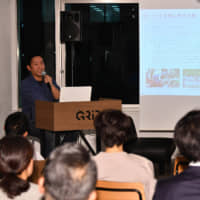At the seventh Satoyama Cafe in Tokyo, Naoto Akagi, president of the Ashitaka incorporated association in Maniwa, Okayama Prefecture, spoke about how the association effectively uses the resources of the city's northeastern rural district of Chuka.
The talk on Jan. 15 was co-hosted by the Japan Times Satoyama Consortium and the Chiiki Ouen (regional support) Bash community organization established by Gaiax Co. and Ouen Fes. The consortium helps relevant parties' efforts for effective utilization of satoyama (mountains and woods shared and maintained by residents of the adjacent communities) in rural regions.
Akagi runs Ashitaka, leading 14 community-based projects. He was born in Osaka and attended university in Okayama Prefecture. After having worked extremely long hours as a retail buyer in the prefectural capital, he moved to his wife's hometown of Chuka, determined to live like a normal person, spending more time with his family and the community.
"When my daughter was born, I only saw her awake several days a month because I left so early for work and came home so late," Akagi said. Busy urban life does not allow time for people to get to know their neighbors either.
In Chuka, people's lives are deeply rooted in the community. "There are as many as 18 local festivals throughout the year, and there is no border between the premises of Chuka Shrine and the primary school's playground," he noted.
Many parts of Japan's countryside are suffering from progressive depopulation and aging, and Chuka, with only about 600 residents, is no exception.
Akagi felt the need to boost the economy in the region to revitalize the local market. He decided to create a livelihood based on the small community's memories, wisdom and ways of thinking to make Chuka a place where existing residents want to stay and new people want to come.
The first major project was the management of the two wood-fired boilers that heat the spring water for Tsuguro Kogenso, a public onsen (hot spring) lodge.
"The local government installed the boilers, but operation-wise, nothing had been planned, so I came forward and started from working out the purchase and selling prices of firewood," Akagi said.
Mostly elderly area residents collect firewood from the land they own or property owned by the government based on zones set up to prevent overcutting. Ashitaka pays ¥6,000 for a small pickup truck full of firewood and prepares it for burning in the boilers.
"It's important to make it as simple as possible so everyone can take part," he noted.
Akagi distributed flyers to all 250 households in the district, and 14 people initially chose to participate as firewood suppliers. Although he was a newcomer, he built trust with the participants and gradually more people started to join. New residents can also start earning from the day they arrive while making connections with area residents at the same time.
Another example of Ashitaka's business to utilize the area's existing resources is the production of iburigakko (smoked and pickled daikon), which was originally a delicacy of Akita Prefecture in northern Japan. Akagi noticed that there were many excess daikon discarded in the backyards of neighboring farmers' houses, and he tried to think of a way to not waste them.
He thought that making preserved food with daikon may solve the problem, and started visiting Akita Prefecture every year to learn how to make iburigakko. After four years of trial and error, he finally succeeded in producing additive-free iburigakko, and started selling them in 2016.
"Last year, 3,000 orders of iburigakko sold out within several weeks, and the people in Akita who had taught and supported me were happy for us. We advertise each other's products," Akagi said. The community-based business is not only flourishing inside the region, but also connecting two communities that are geographically far apart.
Akagi's organization also makes tea and essential oils from wild spicebush that grows in the area.
"For this project, six people showed interest in working with us," he said.
In rural Japan, many jobs have moved out of the community due to a lack of manpower or skills lost between generations even though other resources are still there.
"Ashitaka's mission is to bring such jobs back to the community," Akagi said.
This series introduces municipalities and local companies promoting the beauty and excellence of deep Japan.




